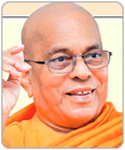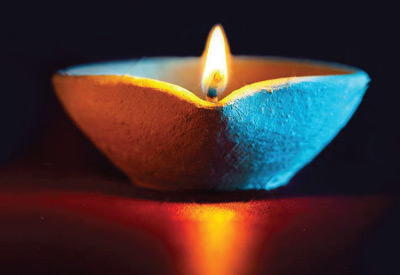The Virtuous deserve the stained robe
 Weragoda Weragoda
Sarada Maha Thero
Yo ca vantakasavassa
Silesu susamahito
Upeto damasaccena
Sa ve kasavamarahati
But one who is self-cleansed of stain,
in moral conduct firmly set,
having restraint and truthfulness
is fit for the stainless robe.
So the leader of the herd sent the other elephants on ahead and walking very
slowly, brought up the rear himself. When the rest of the elephants had paid
obeisance and passed on, the elephant-hunter saw the Buddha approach, whereupon
he gathered his robe together and threw his spear.
The Buddha fixed his attention as he approached, and stepped backwards to avoid
the spear. “This is the man who killed my elephants,” through the Buddha, and
forthwith sprang forwards to seize him. But the elephant-hunter jumped behind a
tree and crouched down.
Thought the Buddha. “I will encircle both the hunter and the tree with my trunk,
seize the hunter, and dash him to the ground.” Just at that moment the hunter
removed the yellow robe and allowed the elephant to see it. When the Great Being
saw it, he thought to himself. “If I offend against this man, the reverence
which thousands of Buddhas, Private Buddhas, and Arahats feel towards me will of
necessity be lost.” Therefore he kept his patience.
Then he asked the hunter, “Was it you that killed all these kinsmen of mine?”
“Yes, master,” replied the hunter. “Why did you do so wicked a deed? You have
put on robes which become those who are free from the passions, but which are
unbecoming to you. In doing such a deed as this, you have committed a grievous
sin.” So saying, he rebuked him again for the last time. “Unbecoming is the deed
you have done,” said he.
When the Buddha had ended this lesson, he identified the characters in the
Jataka as follows, “At that time the elephant-hunter was Devadatta, and the
noble elephant who rebuked him was I myself. Monks, this is not the first time
Devadatta has worn a robe which was unbecoming to him.”
Commentary
The ‘stained cloth’ is a symbol of purity for the Buddhist. He holds as sacred
and holy this specially prepared monk’s robe. The Buddhist bows down in homage
to the wearer of this robe. The robe signifies the Sangha which is a part of the
Holy Trinity of the Buddhist: Buddha, Dhamma and Sangha.
When a person is ordained as a Buddhist monk, the person feels that he has risen
a above the mundane realm and become a holy person. This feeling is reinforced
when laymen bow down before him. This new ‘self-image’ helps the newly ordained
person to start a new life of holiness. The layman too gets inspiration by
seeing and worshiping the wearer of the robe. This Veneration of the robe,
therefore, is an important part of the Buddhist practice.
This is why person contaminated by profanity is not worthy of the yellow cloth.
It is a sacrilege to wear it, if he is impure. It is a desecration of the sacred
robe. |